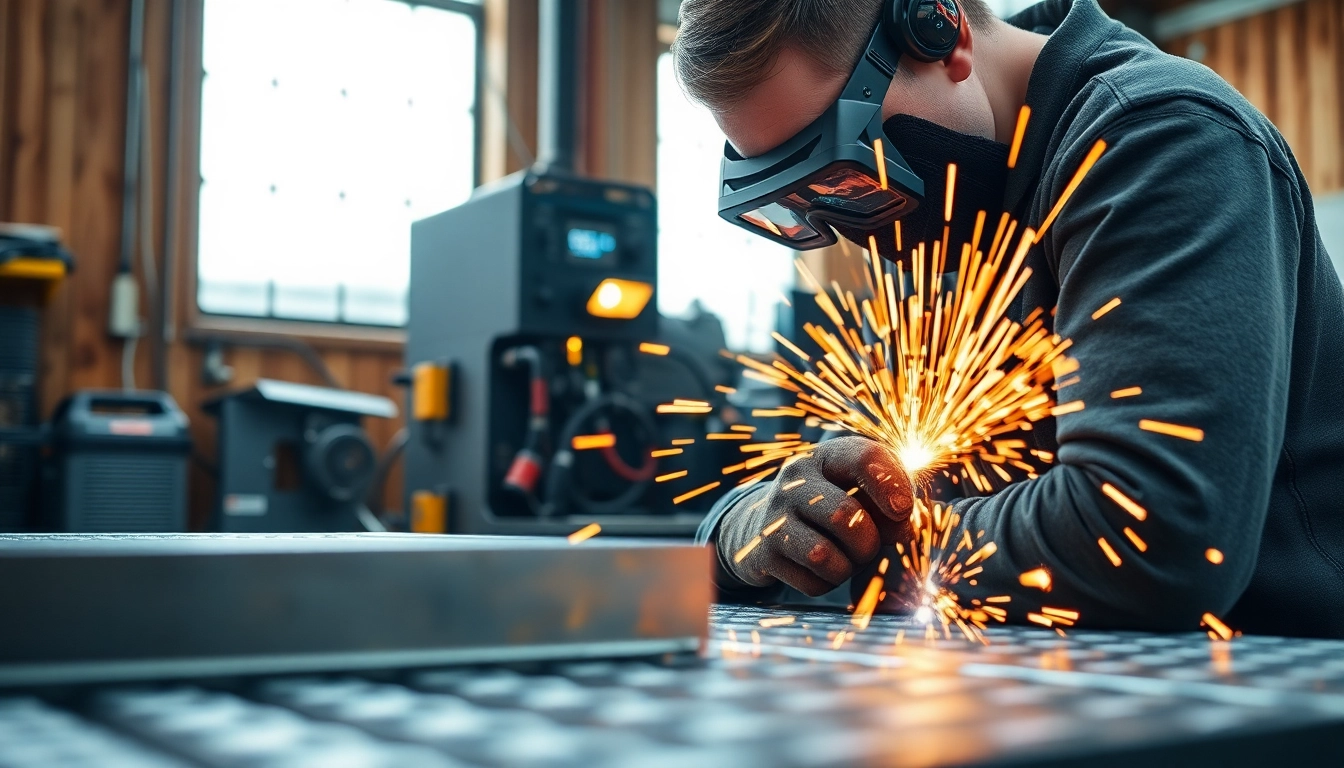Understanding Welding Supplies and Their Importance
Welding is a fundamental process in many industries, from construction and automotive to manufacturing and artistry. To successfully execute a welding project, understanding the various welding supplies available is paramount. When seeking welding supplies near me, it’s essential to identify the types of tools and materials you need, how to select them, and where to find them. This comprehensive guide delves deep into the aspects of welding supplies, including their significance, types, and best purchasing practices.
Types of Welding Supplies Available
The range of welding supplies is vast, and selecting the right items depends on the specific welding process you are engaged in. Here are the main categories of welding supplies you should be aware of:
- Welding Machines: These are the core of any welding setup, with various types suited for different welding techniques, including MIG, TIG, and Stick welding.
- Welding Electrode Rods: Commonly used in arc welding, these rods come in different sizes and types, with each type catering to specific materials and welding processes.
- Welding Wires: Essential for MIG welding, these wires are available in various materials, including mild steel, stainless steel, and aluminum.
- Gas Supplies: For processes such as TIG welding, argon and carbon dioxide gases are essential to stabilize the arc and protect the weld area.
- Protective Gear: Safety items like helmets, gloves, boots, and jackets are crucial to protect welders from harmful UV rays, sparks, and high temperatures.
- Accessories and Tools: This includes clamps, grinders, and cleaning supplies that assist in the welding process and ensure precision.
Common Uses of Welding Supplies
Welding supplies serve numerous functions across different sectors:
- Construction: Welding is pivotal in building structural components, reinforcing frameworks, and fabricating metal elements.
- Automotive: Repairing and assembling parts in vehicles requires reliable welding supplies, especially for high-stress areas.
- Art and Sculpture: Artists use welding techniques to create intricate metal sculptures, requiring a keen eye for detail and high-quality supplies.
- Aerospace: In the aerospace sector, welding supplies must meet strict quality standards to ensure safety and performance at high altitudes.
How to Choose the Right Equipment
Choosing the appropriate welding supplies involves several considerations:
- Welding Type: Understand which type of welding best suits your application, as this will dictate the equipment and materials required.
- Material Compatibility: Ensure that the supplies you choose are compatible with the materials you will be working with.
- Quality and Brand: Select reputable brands known for the quality of their products, which can make a significant difference in performance and safety.
- Budget: Determine your budget beforehand but remember that investing in quality can reduce long-term costs.
Local Options: Where to Find Welding Supplies Near Me
Finding local welding supplies can be highly beneficial, especially when you need items quickly. Here are some options in your vicinity:
Top Local Retailers for Welding Supplies
Some of the best-known names offering welding supplies include:
- The Home Depot: Known for a wide selection of welding supplies, Home Depot allows you to purchase and pick up items locally.
- Tractor Supply Co: This retailer provides welding and soldering tools across many locations.
- Lowes: A reliable source for welding accessories and tools, Lowes offers an extensive online catalog that can be accessed in-store.
- Ace Hardware: With numerous locations, Ace Hardware offers welding supplies, including specialty items and unique brands.
Online vs. Local Purchases: Pros and Cons
While local stores offer immediacy and the advantage of physically examining products, online retailers can provide a broader selection and often better prices. Consider the following:
- Convenience: Online shopping can be done anytime, while local stores have fixed hours.
- Product Variety: Online stores may stock a wider range of brands and products.
- Shipping Time: Local purchases can provide instant gratification, whereas online orders can take days to arrive.
- Cost Comparisons: Online platforms often offer better deals, discounts, and reviews from other customers.
Tips for Finding Local Welding Supply Stores
When searching for local welding supply stores, consider these strategies:
- Online Directories: Use online maps and directories to locate welding supply stores near you quickly.
- Word of Mouth: Ask fellow welders or industry professionals for their recommendations.
- Social Media: Platforms like Facebook and LinkedIn can connect you with local suppliers and groups.
Choosing the Right Welding Supplies: A Guide
When it’s time to make a purchase, following a well-structured criterion can help ensure that you select quality welding supplies that meet your needs:
Evaluating Quality and Pricing
Quality and price often go hand-in-hand in the welding industry. Here’s how to assess them:
- Brand Analysis: Research different brands and their reputations concerning durability and performance.
- Material Specification: Pay attention to the materials used in welding supplies; high-grade materials typically yield better performance.
- Overall Cost: Look beyond the price tag; consider the long-term value and durability of the supplies.
Reviews and Recommendations
Reviews can be invaluable in helping you choose welding supplies, as they provide firsthand experiences from other users. Follow these tips to utilize reviews:
- Read Multiple Reviews: Look for patterns in reviews to assess the reliability and performance of products.
- Industry Forums: Engage in online communities and forums where professionals discuss their experiences with various supplies.
- Professional Recommendations: Seek advice from experienced welders or your instructor, as they often have insights into the best supplies.
Understanding Returns and Warranties
Before purchasing, ensure that you understand the return policies and warranties associated with your welding supplies:
- Return Policy: Know the conditions under which you can return products if they do not meet your expectations.
- Warranty Coverage: Look for warranties that cover manufacturing defects and failures to ensure your equipment is protected.
Safety First: Essential Tips for Welding Supplies Use
Using welding supplies safely is vital to preventing accidents and injuries. Here are some guidelines:
Protective Gear You Need
Investing in high-quality protective gear is essential for every welder. The basic gear includes:
- Welding Helmet: A helmet protects your eyes from harmful UV light and sparks while allowing you to see the weld area.
- Gloves: High-temperature gloves prevent burns and provide a good grip on tools.
- Protective Clothing: Wear flame-resistant jackets and trousers to shield your skin from sparks and heat.
- Welding Boots: Sturdy, steel-toed boots protect your feet from heavy equipment and hot materials.
Safe Handling and Storage of Welding Supplies
Proper storage and handling maximize safety when working with welding supplies:
- Storage Conditions: Store supplies in a dry, cool place away from flammable materials.
- Tool Maintenance: Regularly check your tools and equipment for wear and damage, ensuring everything is safe to use.
- Proper Loading: Use appropriate methods when loading or unloading heavy equipment to avoid injuries.
Common Mistakes and How to Avoid Them
Welders, especially beginners, often make simple mistakes. Here’s how to avoid them:
- Using Incorrect Supplies: Ensure you use supplies designed for your specific welding method.
- Overlooking Safety Precautions: Always wear protective gear and follow safety protocols in your working environment.
- Neglecting Equipment Maintenance: Routine maintenance helps extend the life of your welding equipment and ensures safe operation.
Advanced Welding Supplies Techniques and Innovations
The welding field is continuously evolving with technological advancements that improve performance and safety:
Latest Technology in Welding Equipment
Recent innovations in welding technology are transforming how welders operate:
- Robotic Welding: Automation in welding processes improves accuracy and efficiency in mass production settings.
- Inverter Technology: Modern inverter-based welding machines are more portable, energy-efficient, and provide superior arc stability.
- Advanced Gas Mixes: New gas mixtures help produce cleaner and stronger welds with less spatter.
Comparative Analysis of Different Welding Methods
Each welding method serves unique purposes, and understanding their differences is vital:
- MIG Welding: Ideal for thin materials and quick setups, it offers speed and ease of use.
- TIG Welding: Known for producing high-quality and precise welds, it is ideal for detailed work but requires skill.
- Stick Welding: Versatile and effective for outdoor use, it is great for thicker materials but may be less aesthetically pleasing.
- Flux-Cored Arc Welding: A suitable option for welding thicker metals, especially in construction and repair work.
The Future of Welding Supplies and Developments
The future of welding supplies looks promising with ongoing research and development. Innovations are focused on:
- Sustainable Practices: Environmentally friendly welding materials and processes are gaining traction.
- Enhanced Safety Technologies: New protective gear with better materials and features is being developed to improve welder safety.
- Smart Welding Equipment: The integration of IoT devices allows for real-time monitoring of welding processes, leading to increased efficiency.



